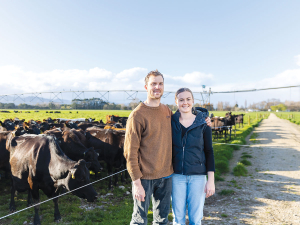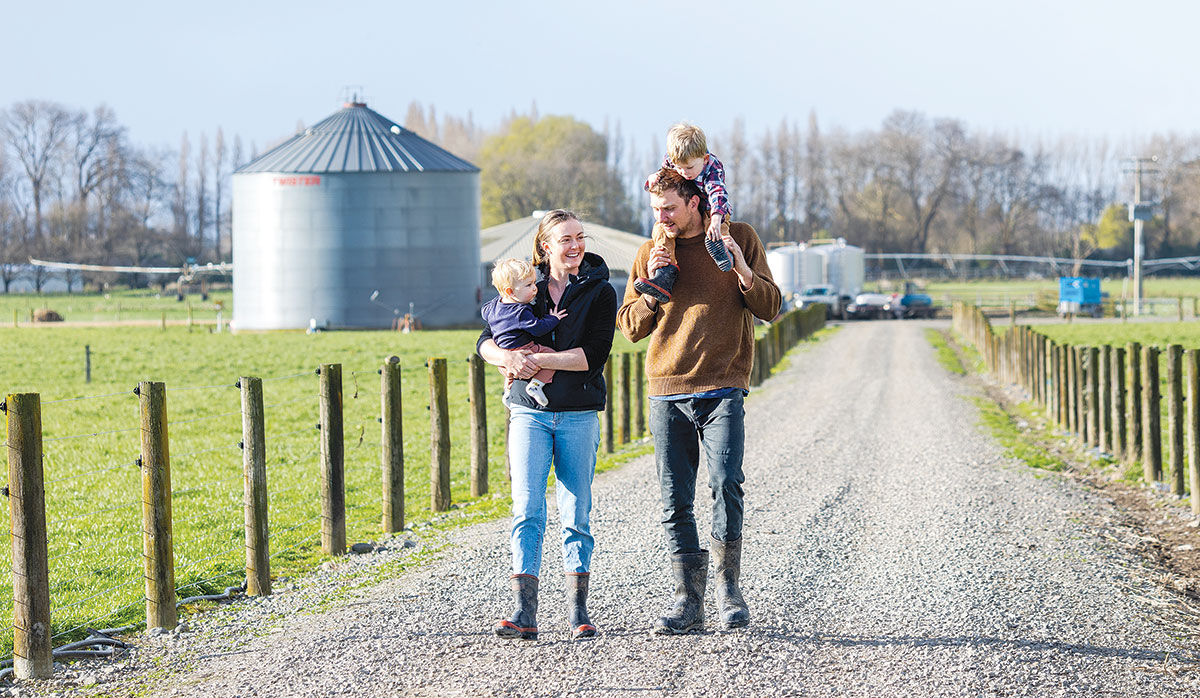NZ Catchment Groups Thrive with ‘Source to Sea’ Approach
The most successful catchment groups in NZ are those that have 'a source to sea' approach.
 Hamish and Rachel Hammond are now in their second season as 50:50 sharemilkers on Hamish’s family farm in Wairarapa.
Hamish and Rachel Hammond are now in their second season as 50:50 sharemilkers on Hamish’s family farm in Wairarapa.
Hamish and Rachel Hammond jumped at the chance to put their university learning into practice by taking up a contract milking offer right after graduation.
What started as a five-year plan quickly became a passion, and they are now in their second season as 50:50 sharemilkers on Hamish’s family farm in Wairarapa.
“The farm manager was leaving so Dad proposed we come home to try contract milking,” Hamish explains.
“He was offering the opportunity to run our own business and apply the theory we’d been learning.”
The farm borders Greytown, where Hamish’s great-grandfather started farming in the late 1920s, making Hamish a fourth-generation farmer.
The couple met at Massey University. Hamish had taken a break between his undergraduate studies and master’s degree in Agribusiness and Farm Management to compete as an international triathlete. Rachel was chipping away at her master’s in Animal Science.
It was 2017 when Hamish’s father, Stephen Hammond, made the proposal. Until then, Rachel’s minimal experience of dairy farming amounted to a summer placement and some relief milking during her studies. She had grown up on an apple orchard in Nelson. But the couple were confident enough to give it a go.
“We’ve enjoyed the challenge and opportunities that farming provides versus other post-study job options we were considering,” Rachel says.
“A farm is a great place to bring up a family, with our children spending time outdoors and with animals every day.”
The couple have two sons, three-year-old George and Lou, who is approaching one. Hamish is full-time on the farm, with Stephen and another team member keeping the ship running. Rachel helps part-time during busy periods.
The farm is 175 hectares, and they have 200ha worth of support blocks within walking distance of the platform. Some of the platform and support is leased.
Operations run on both owned and leased land. The main farm is 175ha, and there are 200ha of support blocks nearby, all within walking distance.
They are milking 600 spring-calving cows once a day (OAD) for the full season.
“OAD milking gives us flexibility. We still have a good workload, but we’re not tied to the shed in the afternoons, and we feel more efficient,” Hamish explains.
“The cows have adapted well and are producing just as much milk as they did on twice-a-day milking, which has helped us chase that efficiency,” Rachel adds.
Hamish and Rachel are particular about breeding. They aim for a highly productive, efficient, robust animal with a strong udder and high milk solids but low volume. The herd averages about 470kg in liveweight.
The top 60% of the herd, based on breeding worth, are mated to nominated sires and the remainder go to Angus semen.
“Using Angus, as well as a heifer synchronisation programme, has allowed us to improve our selection intensity and make significant herd improvements,” Rachel says.
They keep all of the Angus calves and finish them on one of their support blocks, a venture they started in 2019 to earn some extra money while they were contract milking.
They operate a System 3, with pasture making up the majority of the herd’s diet. Grass silage is made on the support blocks and fed in the shoulders of the season.
They use in-shed feeding to provide a small amount of barley grain and minerals, which helps encourage the cows to enter the shed. The barley quantity is adjusted as needed, based on the season.
“It’s a typical Wairarapa climate: we are wet in winter and dry in summer, with 1000 to 1100mm of rainfall mostly in autumn, winter and spring,” Hamish says.
They use turnips and chicory to keep the cows fully fed and the farm is 70% irrigated with two centre pivots and some long lateral irrigation. The irrigation has allowed them to trial growing two crops of turnips from one paddock over summer. Last season they grew close to 20t; 13t from the first crop and 7t from the second.
“The irrigation enables us to have better crops and we’re making good use of the water.
“Otherwise, we would finish the crop in mid-January when it’s hard to establish pasture, so we are basically irrigating weeds.”
As Efficient As Possible
There are several environmental initiatives on the farm, and they try to be as efficient as possible with any inputs they use.
“We’ve got soil moisture meters, which are great to prevent over-using the irrigation,” Rachel explains. “Especially in the wetter periods like autumn and the start of the irrigation season.
“It helps with applying fertiliser too; if we know it’s too wet or the soil temperature is too low, we won’t apply any.”
 |
|---|
|
Hamish and Rachel Hammond with sons George and Lou. |
Their effluent storage has a weeping wall that removes the solids, which are used on the crop paddocks. It recycles the greenwater and they use that to wash the yard, which reduces their water usage in the shed significantly.
Hamish chairs the Wairarapa Water Users Society, which advocates for fair and science-based decision-making on regulations and compliance. The society promotes best-practice irrigation methods and organises training and field days.
On the farm, the Hammonds have been planting alongside the stream and boundaries, providing shade and shelter for animals.
The couple enjoy collaborating with fellow community members to protect and improve the Pāpāwai stream and the nearby bush block. As part of the small Pāpāwai Stream Care group, they have been actively involved in yearly planting efforts and managing the established plantings.
Rachel says the group started many years ago and Hamish’s granddad, Malcolm Hammond, and father Stephen were involved in some of the first plantings.
“We are committed to best practice in everything we do, including breeding the best cows and being efficient with feed and fertiliser use. We want a really sustainable farming business that’s resilient to change,” Hamish says.
“We don’t think we’re doing anything flash, we’re just focused on getting the basics right while balancing our work and family life.”
As Efficient As Possible
There are several environmental initiatives on the farm, and they try to be as efficient as possible with any inputs they use.
"We've got soil moisture meters, which are great to prevent over-using the irrigation," Rachel explains. "Especially in the wetter periods like autumn and the start of the irrigation season.
"It helps with applying fertiliser too; if we know it's too wet or the soil temperature is too low, we won't apply any."
Their effluent storage has a weeping wall that removes the solids, which are used on the crop paddocks. It recycles the greenwater and they use that to wash the yard, which reduces their water usage in the shed significantly.
Hamish chairs the Wairarapa Water Users Society, which advocates for fair and science-based decision-making on regulations and compliance. The society promotes best-practice irrigation methods and organises training and field days.
On the farm, the Hammonds have been planting alongside the stream and boundaries, providing shade and shelter for animals.
The couple enjoy collaborating with fellow community members to protect and improve the Pāpāwai stream and the nearby bush block. As part of the small Pāpāwai Stream Care group, they have been actively involved in yearly planting efforts and managing the established plantings.
Rachel says the group started many years ago and Hamish's granddad, Malcolm Hammond, and father Stephen were involved in some of the first plantings.
"We are committed to best practice in everything we do, including breeding the best cows and being efficient with feed and fertiliser use. We want a really sustainable farming business that's resilient to change," Hamish says.
"We don't think we're doing anything flash, we're just focused on getting the basics right while balancing our work and family life."
The Meat Industry Association of New Zealand (MIA) today announced that Chief Executive Officer Sirma Karapeeva has resigned from the role.
The winners of the 2026 Hawke’s Bay/Wairarapa Dairy Industry Awards were announced at the annual awards dinner held at Copthorne Solway Park in Masterton on Thursday evening.
Environment Southland is welcoming this week’s decision by the Environmental Protection Authority (EPA) to approve the release of Blaptea elguetai, a leaf‑feeding beetle that will help control the highly invasive Chilean flame creeper.
This March, the potato industry is proudly celebrating International Women’s Day on 8 March alongside the International Year of the Woman Farmer, recognising the vital role women play across every part of the sector — from paddocks and packhouses to research, leadership, and innovation.
Fruit trader Seeka posted a record profit and returns to shareholders in 2025.
Recent weather events in the Bay of Plenty, Gisborne/Tairawhiti, and Canterbury have been declared a medium-scale adverse event.
OPINION: Staying with politics, with less than nine months to go before the general elections, there’s confusion in the Labour…
OPINION: Winston Peters' tirade against the free trade deal stitched with India may not be all political posturing by the…